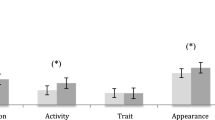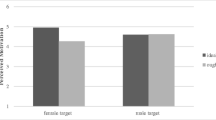Abstract
Subjects rated 12 stimulus persons (SPs) on maladjustment in several areas, and on the likelihood of requiring psychiatric help, in a person perception task. Half of the SPs were male and half female. Half of each were sex-role congruent and half sex-role deviant in terms of occupation, life styles, or interests, though “normal” in all other respects. Bias scores were constructed for subjects reflecting the extent to which each was influenced by sex-role deviance. Measures of gender stereotyping and sex-role ideology were also obtained. Results showed that sex-role deviant SPs were rated as significantly more maladjusted than congruent SPs and more likely to require psychiatric help. Sex-role deviance had a much greater effect on male than female SPs. Gender stereotyping and sex-role ideology showed only a moderate relationship, which suggests that these concepts should be distinguished. Measures of evaluative bias showed low to moderate relationships with sex-role ideology and very low correlations with gender stereotyping.
Similar content being viewed by others
References
Bardwick, J. M. Psychology of women: A study of biocultural conflicts. New York: Harper and Row, 1971.
Bem, S. L. Sex-role adaptability: One consequence of psychological androgyny. Journal of Personality and Social Psychology 1975, 31 634–643.
Chesler, P. Women and madness. New York: Avon, 1973.
Coie, J. D., Pennington, B. F., & Buckley, H. H. Effects of situational stress and sex roles on the attribution of psychological disorder. Journal of Consulting and Clinical Psychology 1974, 42 559–568.
Etaugh, C., & Sanders, S. Evaluation of performance as a function of status and sex variables. Journal of Social Psychology 1974, 94 237–241.
Gardner, J. Sexist counselling must stop. Personnel and Guidance Journal 1971, 49 705–713.
Goldberg, P. Are women prejudiced against women? Transaction 1968, 5 28–30.
Hartley, R. E. Sex-role pressures and the socialization of the male child. Psychological Reports 1959, 5 457–468.
Horner, M. S. Toward an understanding of achievement-related conflicts in women. Journal of Social Issues 1972, 28 157–177.
Kalin, R., & Tilby, P. J. The development and validation of a sex role ideology scale. Psychological Reports 1978, 42 731–738.
MacBrayer, C. T. Differences in the perception of the opposite sex by males and females. Journal of Social Psychology 1960, 52 309–314.
McKee, J. P., & Sherriffs, A. C. Men's and women's beliefs, ideals and self-concepts. American Journal of Sociology 1959, 64 356–363.
Mischel, H. N. Sex bias in the evaluation of professional achievements. Journal of Educational Psychology 1974, 66 157–166.
Pheterson, G. I., Kiesler, S. B., & Goldberg, P. A. Evaluation of the performances of women as a function of their sex, achievement and personal history. Journal of Personality and Social Psychology 1971, 19 114–118.
Polk, B. B., & Stein, R. B. Is the grass greener on the other side? In C. Safilios-Rothschild (Ed.), Toward a sociology of women. Lexington, Mass.: Xerox, 1972.
Rosen, B., & Jerdee, T. H. Effects of applicants' sex and difficulty of job evaluation of candidates for managerial positions. Journal of Applied Psychology 1974, 59 511–512.
Seyfried, B. A., & Hendrick, C. When do opposites attract? When they are opposite in sex and sex-role attitudes. Journal of Personality and Social Psychology 1973, 25 15–20.
Spence, J. T., & Helmreich, R. Who likes competent women? Competence, sex-role congruence of interests, and subjects' attitudes towards women as determinants of interpersonal attraction. Journal of Applied Social Psychology 1972, 2 197–213.
Spence, J. T., Helmreich, R., & Stapp, J. Likeability, sex role congruence of interest, and competence: It all depends on how you ask. Journal of Applied Social Psychology 1975, 5 93–109.
Wicker, A. W. An examination of the “other variables” explanation of attitude-behavior inconsistency. Journal of Personality and Social Psychology 1971, 19 18–30.
Zeldow, P. B. Effects of nonpathological sex role stereotypes on student evaluations of psychiatric patients. Journal of Consulting and Clinical Psychology 1976, 44 304.
Author information
Authors and Affiliations
Additional information
This research is based on parts of a doctoral dissertation by the first author. It was supported by an Ontario Mental Health Foundation Research Studentship Award to the first author and by Canada Council Grant #S74-0707 to the second author.
Rights and permissions
About this article
Cite this article
Tilby, P.J., Kalin, R. Effects of sex-role deviant lifestyles in otherwise normal persons on the perception of maladjustment. Sex Roles 6, 581–592 (1980). https://doi.org/10.1007/BF00287888
Issue Date:
DOI: https://doi.org/10.1007/BF00287888




